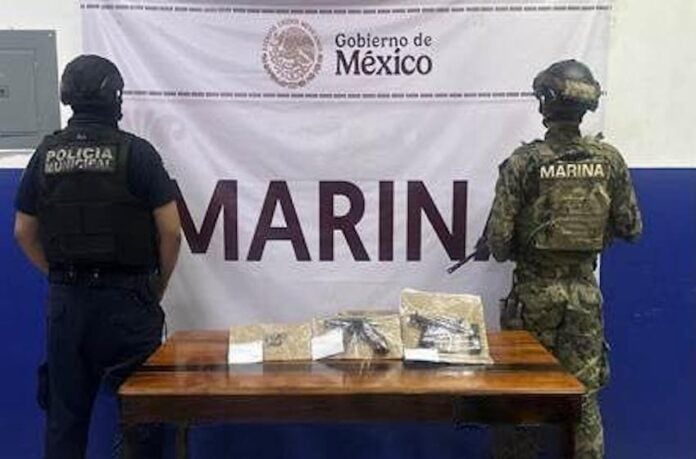The Mexican Navy announced Tuesday that it had detained 54 people in recent days in Colima, Mexico’s most violent state in terms of homicides per capita.
The suspects are believed to be members of the Jalisco New Generation Cartel (CJNG), or a crime group previously affiliated with that organization, according to media reports.
The Navy Ministry (Semar) said in a statement that as part of the “Pez Vela 2025” security strategy, navy personnel arrested 54 “alleged lawbreakers” in recent days in the municipalities of Manzanillo, Tecomán, Villa de Álvarez and Colima.
The navy personnel, who were acting “in coordination” with the Federal Attorney General’s Office and state and municipal authorities in Colima, also seized four firearms, ammunition, 18 bladed weapons, a pickup truck that had been reported as stolen, eight motorcycles, “presumed” drugs, two computers and nine mobile phones, among other items, according to the Semar statement.
Five properties were also secured.
The Navy Ministry said that the suspects and the seized items were turned over to “the relevant authorities.”
The newspaper Reforma reported that the suspects are “linked” to the CJNG, while the news site Sin Embargo wrote that they are “alleged members” of that cartel.
The news site Infobae México reported that “security sources” confirmed that the suspects belong to Los Mezcales, “a crime group that originally formed part of the Jalisco New Generation Cartel.”
Como parte de la estrategia de seguridad “Pez Vela 2025”, durante recorridos de vigilancia en las colonias Tecomán, Villa de Álvarez y Colima en Manzanillo, personal naval logró la detención de 54 presuntos infractores de la ley, aseguramiento de armas, sustancias ilícitas y… pic.twitter.com/GOBL472ZSF
— SEMAR México (@SEMAR_mx) November 18, 2025
The two crime groups are no longer affiliated, Infobae reported, citing a deadly 2022 prison riot in Colima city as the event that precipitated their “definitive breakup.”
In its statement, Semar reaffirmed its commitment to “the society of Colima” to “strengthen peace, security and well-being” of families.
Colima leads Mexico for homicides per capita
According to the crime statistics website elcri.men, Colima ranked as Mexico’s most violent state in the 12 months to the end of October with 84.8 homicides per 100,000 people.
Morelos ranked second, followed by Sinaloa, Chihuahua and Baja California.
Colima, made up of just 10 municipalities, is Mexico’s least populous state, with just over 730,000 residents, according to the 2020 census results. Bordering the states of Jalisco and Michoacán, as well as the Pacific Ocean, Colima is Mexico’s fifth smallest federal entity by area.
Criminal control of the port of Manzanillo — a major entry point for fentanyl precursor chemicals from China — is highly coveted by crime groups, as are trafficking routes that run north and northeast from the Pacific coast state.
In terms of total homicides, Colima was Mexico’s 17th most violent state in the first 10 months of 2025 with 507 murders, according to data presented by the federal government last week.
It remains to be seen whether the arrest of the 54 criminal suspects will lead to a reduction in homicides in Colima.
Federal officials have attributed a reduction in homicides in Guanajuato to the arrest in March of members of a crime cell linked to a range of crimes in that state, including homicides. Despite the decline, Guanajuato continues to lead the country for total homicides, with 2,229 between January and October.
Arrests are up, homicides are down, but government still faces pressure over its anti-crime efforts
The announcement of the 54 arrests in Colima comes the week after two alleged CJNG operators and “generators of violence” were arrested in the Pacific coast state. Both Jaime Tonatiuh Mendoza Fregoso and Yajaira Berenice “N”, a woman known as “La China,” were detained in Manzanillo.
Meanwhile, Security Minister Omar García Harfuch reported on Nov. 11 that 37,000 people had been arrested for allegedly committing high-impact crimes such as murder and kidnapping since the current federal government took office on Oct. 1, 2024.
Data presented by the federal government the same day showed that the daily average number of homicides in the first 10 months of 2025 was 27.9% lower than the daily average across 2024.
Even though arrests are up and homicides are down — achievements that President Sheinbaum has attributed to her government’s security strategy — protests against insecurity were held in cities across Mexico last Saturday.
Anti-government and anti-Morena sentiment were on prominent display in the protests, which were organized by a Generation Z movement, but attracted older Mexicans in large numbers.
A major catalyst for the protests was the Nov. 1 assassination of Uruapan mayor Carlos Manzo, an outspoken anti-crime crusader who had urged the federal government to take a more active and aggressive approach to combating Mexico’s notorious criminal organizations.
The federal government responded to his murder and general insecurity in Michoacán with Plan Michoacán, touted by Sheinbaum as a “comprehensive strategy” with “more than 100 actions,” including the deployment of additional troops to the state.
Por instrucciones de la Presidenta @Claudiashein hoy informamos avances en la investigación del asesinato de Carlos Manzo, donde gracias a un trabajo coordinado con la @FiscaliaMich y el @GabSeguridadMX se realizaron labores de inteligencia, análisis de cámaras y seguimiento… pic.twitter.com/AfScKExb5H
— Omar H Garcia Harfuch (@OHarfuch) November 19, 2025
García Harfuch announced Wednesday that an alleged mastermind of Manzo’s murder had been detained. That person, identified as Jorge Armando “N,” is allegedly a leader of a CJNG cell.
The person who shot the mayor was identified as a 17-year-old meth addict. The youth was killed by a municipal police officer in Uruapan’s main square shortly after he allegedly opened fire on Manzo.
With reports from Sin Embargo, Reforma and Infobae
